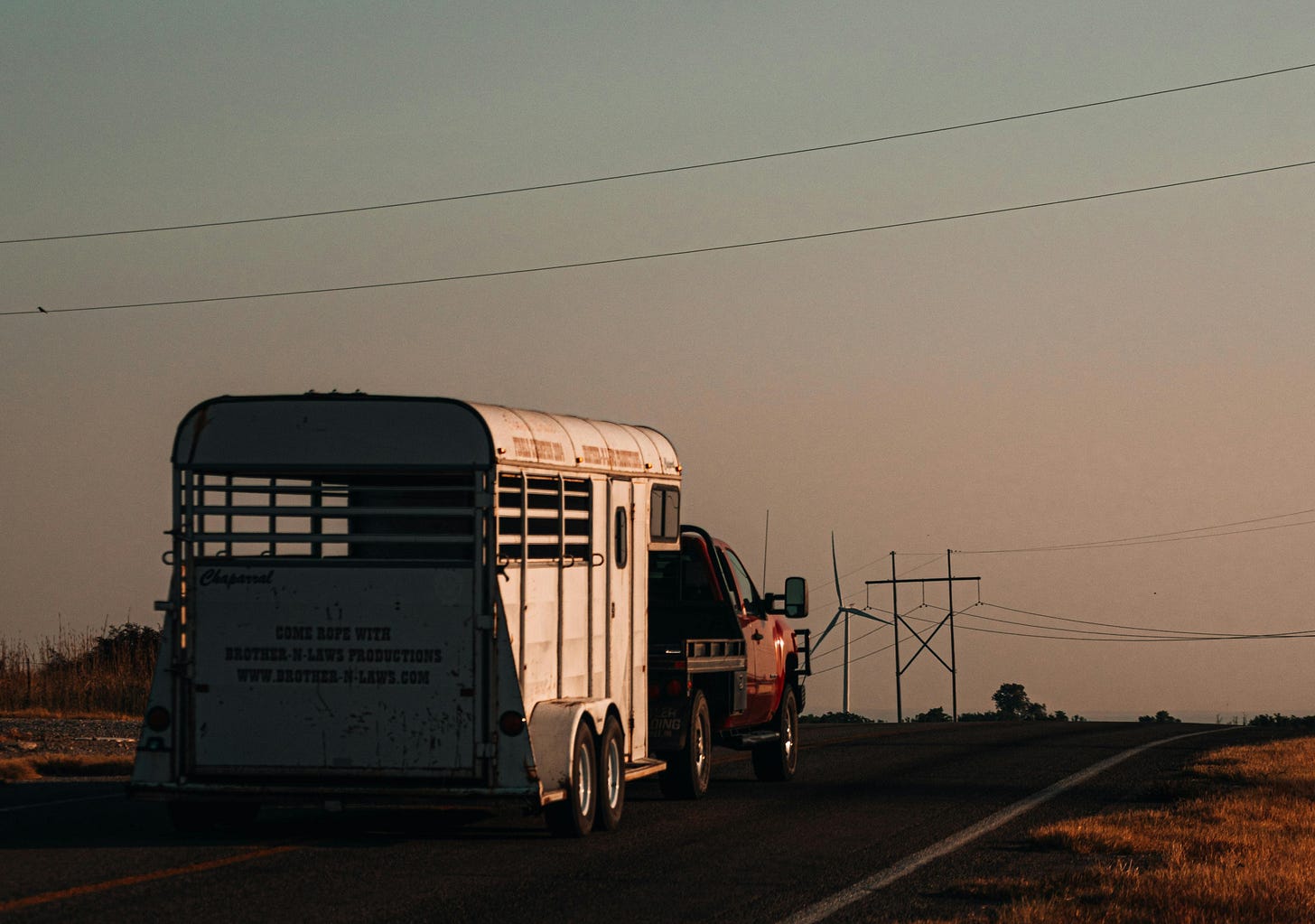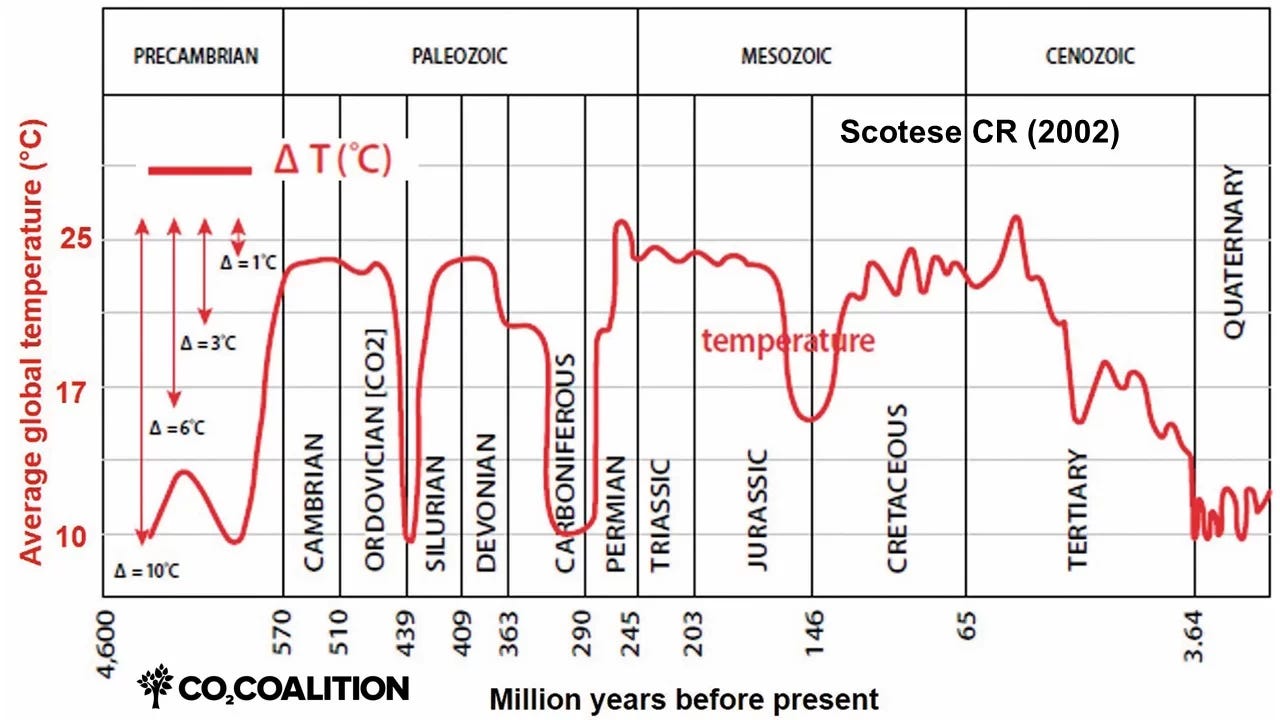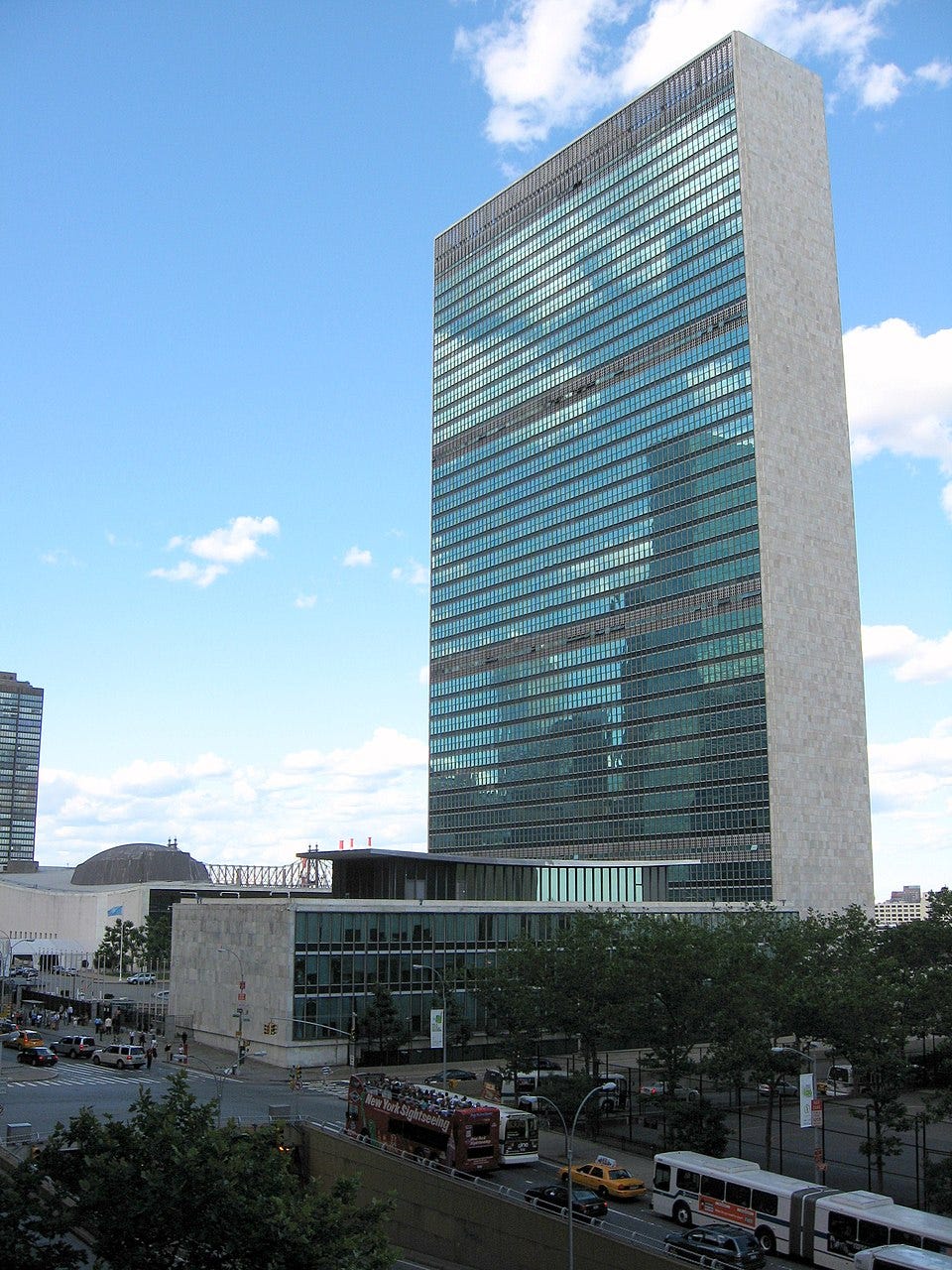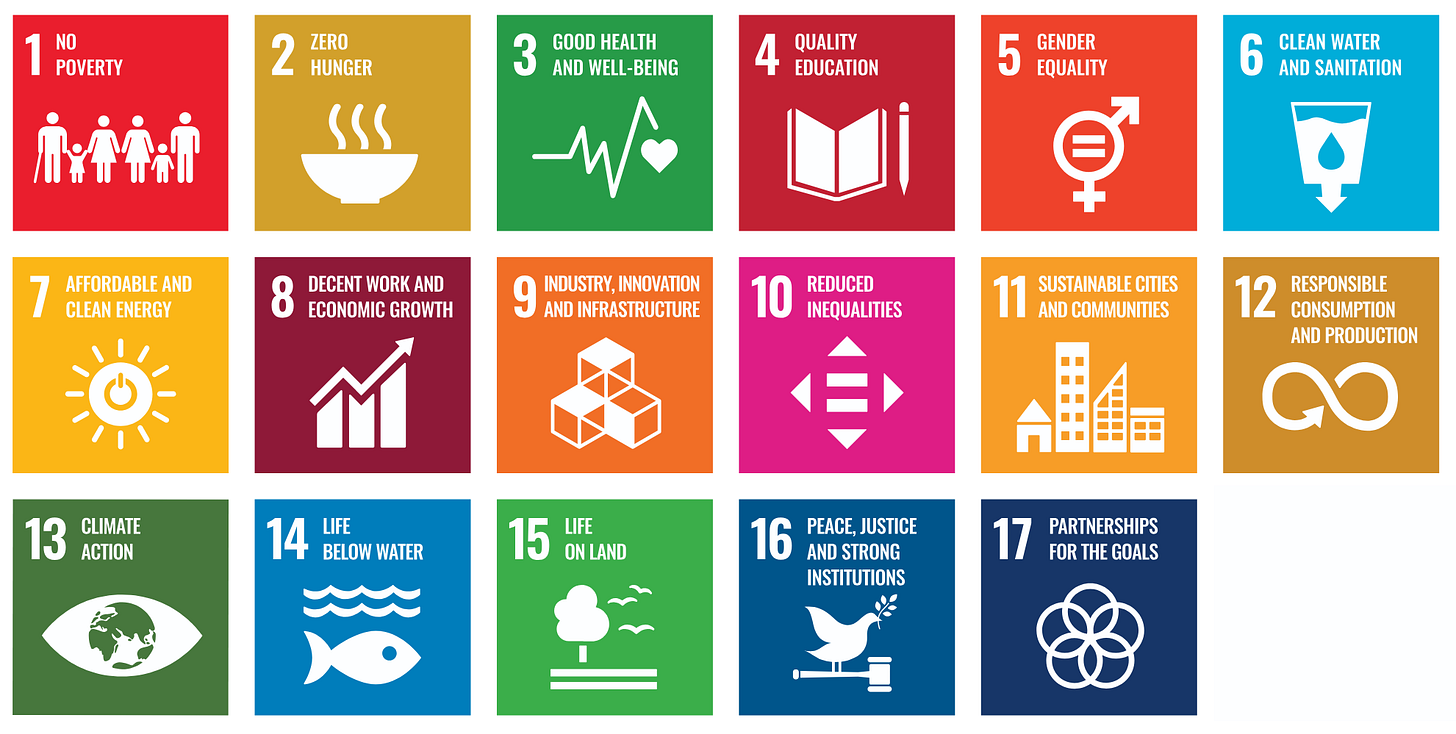We horses stand united
yet we don't bow down to the United Nations
It was a sad day here in the region. We saw four trucks from Hat Four Ranch drive past. All of their horses were in the trailers. We don’t know where they were going, but we could feel their anxiety. Rancher Bob and cowboy Jake were nearby.
Bod watched the trucks drive by and said: “Four Hats are getting rid of their horses. They’re gonna try ranching with electric all-terrain quads. I wonder how that’s gonna work out for them …”
“Why would they wanna do that?” Jake wanted to know.
“The United Nations have declared a ‘climate emergency.’ Now all countries need to impose a forty percent tax on animals.”
Bob spoke calmly, yet one could feel his distress.
“I though states could decide for themselves what to tax?” Jake remarked. He didn’t get an answer on the spot, though.
I was very upset by this news. I paced around the pasture until sunset. What is going to happen to us?

One would think that the United Nations (UN) do not have the authority to interfere in local affairs, such as taxation. After all, for most of its existence, it has been a paper tiger that really didn’t have much of an effect on member country societies, let alone on everyday life in them. Neither should it. The United Nations was established in 1945, on the heels of the Second World War, with the purpose of “maintaining international peace and security.”
Neither taxation, nor the quantity of meat ordinary people consume have anything to do with “maintaining international peace and security.” Yet the United Nations seem to think otherwise. Last June, they held their Fourth International Conference on Financing for Development in Sevilla, Spain. That conference concluded with a joint declaration made by 192 countries, as well as several agreements being signed on the side by a subset of countries. Beyond containing forty-one mentions of the word “tax,” the so-called “Sevilla Compromise” explicitly encourages signatory parties to raise their taxes to at least fifteen percent of their gross domestic product (paragraph 27, item n), as well as to introduce taxes on “natural resources” and “pollution,” just to name a few examples. So what exactly is in the “Compromise?”
The second paragraph of the “Compromise” already mentions what it really is about:
“We reaffirm our commitment to realize sustainable development, including effectively implementing the 2030 Agenda for Sustainable Development and its 17 Sustainable Development Goals and upholding all principles enshrined in it.”
All right, let’s recall what these sustainable development goals are:
Upon first glance, these may appear to be laudable objectives. However, the possibly desirable end goals soon fade when one wonders what would be needed to reach them. Poverty is a deplorable state to live in and we don’t wish it upon others to be poor. It is another thing, though, to mandate “zero poverty” as an end goal. A transition from a global state of affairs with a lot of poverty into a state with “zero poverty” inevitably passes through wealth redistribution. With a few exceptions, it seems unlikely that the happy few would agree to their wealth being redistributed. If they are not going to do that voluntarily, then the UN goal must imply that wealth redistribution will be mandated. If so, by whom? Is there a club of UN bureaucrats who think they are in a position to determine how others can spend their money?
Just a little bit of scrutiny allows us to see that what may appear to be a highly desirable goal to some, is in fact nothing else than socialist totalitarianism in disguise. Socialism has been experimented with oftentimes in various flavours and has never worked. Be it dressed up as international socialism, communism, national socialism, or other guises, socialism has consistently led to the same outcome: a bloated state with a thin cadre of insiders who have all the wealth they can dream of, while the broad population have equality in the sense of being equally poor.

Other sustainable development goals are no different. It sounds great to have “affordable and clean energy” for all, doesn’t it? Except, most of us understand by now that the crux in that sentence is how “clean” is being defined. If “clean” means driving bats, eagles and whales to extinction by paving forest and seabed over with “sustainable” windmills that are not even thirty percent efficient, have a life span of twenty years at best, have giant blades from composite materials that are almost impossible to recycle and only intermittently produce power, then in fact that goal implies a degradation of energy stability rather than progress. Of course, the “and” in “affordable and clean” tells us that both conditions are a prerequisite, so if an energy source is truly affordable, yet deemed “unclean,” as natural gas is, then its use will be impeded nonetheless if the “sustainable development goal” is to be implemented.
The vaguest development may well be “climate action.” In fact the Sevilla Compromise does not only “reaffirm commitment” to this and other goals, but it does highlight individual building blocks in that direction in several places. Beyond re-committing to the “Sustainable Development Goals,” paragraph I.15 reads:
“We are falling short in tackling climate change, biodiversity loss and desertification. We stress the urgency of enhancing ambition for climate action in the implementation of the United Nations Framework Convention on Climate Change (UNFCCC) and the Paris Agreement.”
Let’s recall what the Paris Agreement is. It is a legally binding intergovernmental commitment for signatory parties to do what they can to hold “the increase in the global average temperature to well below 2°C above pre-industrial levels” and to pursue efforts “to limit the temperature increase to 1.5°C above pre-industrial levels.” It apparently wants us to do so, because it is “recognizing the need for an effective and progressive response to the urgent threat of climate change on the basis of the best available scientific knowledge.” One wonders which “scientific knowledge” they have consulted, since climate is a slowly moving forty-year average that can by definition never constitute an “emergency.” Nor do we have any reason to assume that a temperature increase above 2°C would lead to catastrophic outcomes. In fact, several geological analyses point to the fact that we are living in one of the coolest periods in the planet’s history. Of course, many will readily point to politically tainted reports on a scientific page layout in journals like Science or Nature that say otherwise, based on models that fail to predict present climate, yet should be considered “reliable” when predicting catastrophes in the future.

Equally problematic as the Paris Agreement’s objective, is the purported solution to get there. It is sheer hubris to assume that humans can control the climate by reducing some greenhouses gases. Solar activity has a major impact on climate. When looking at greenhouse gases, water vapour, in the form of clouds or otherwise, obviously impacts weather and, by consequence, climate. Humans control neither of both. Nonetheless, the Paris Agreement’s signatories set out to pretend that they will control future climate by reducing a few cherry-picked greenhouse gases, all of which happen to be closely related to our food supply chain. Of course, the latter is merely coincidental.
The Paris Agreement was the first to outline a path to stabilize global temperatures by
“Making finance flows consistent with a pathway towards low greenhouse gas emissions and climate-resilient development.”
Moreover, it does so “being guided by its principles, including the principle of equity” and by “taking into account the imperatives of a just transition of the workforce.” In other words, in many ways, the Paris Agreement was the birthplace of the trifecta of nonsense of “equity,” “social justice” and “sustainable finance.”
Since nations have taken a few too many steps in the direction of realizing these objectives, it should meanwhile have become all too clear that none of these goals are worth pursuing. As commitments to ESG investing made critical defense, energy and infrastructure near unfinanceable and DEI’s commitments to “equitable and fair workplaces” created toxic, counterproductive work environments, one would have expected them to abandon their commitments and reflect on a better path forward. Yet if the Sevilla Compromise establishes anything, then that is a doubling down on flawed aspirations. Recognizing that “we are falling short in tackling climate change,” the Sevilla Compromise calls for an international financial architecture that is more “inclusive, representative, equitable, and effective.”
In an era of modern vocabulary distortion, heightened alertness is warranted whenever terms like “inclusive,” “just” or “equitable” show up, most of all so in connection to finance. Those terms tend to hint at a “carbon credit system” that merely transfers wealth from the masses into the hands of the happy few by making everything more expensive by charging for “carbon credits” for close to nothing in return. While the Sevilla Compromise does not mention carbon credits by name, it does call for a change in our financial system in alignment with such principles. Moreover, it also calls for transferring more wealth from citizens to the government. It encourages “effective taxation of natural resources,” as well as other options, such as “green budgeting, taxation and fiscal rules, and taxes on environmental contamination and pollution.”
The Sevilla Compromise does “address poverty eradication and hunger.” However, if eradication of poverty and hunger were priorities, then the Compromise would advocate for facilitating development of infrastructure for mature energy technologies in developing nations. Facilitation of infrastructure does not align with increased taxation of those same resources. Moreover, “taxes on environmental contamination and pollution” may sound reasonable, but it is all in the eye of the beholder what “pollution” means. We have recently witnessed countries like Denmark levy a tax on cow burps, since the methane gas in their burps is considered “pollution.” We have explained before that even if there were a climate emergency, taxing cow burps would not have a measurable impact at all. All it accomplishes, is to make Danish milk and cheese more expensive.

While the discussions were ongoing in Sevilla, the World Health Organization’s director, Dr. Tedros Adhanom Ghebereysos, presented a speech on the negative effects of alcohol consumption. The speech was very much in line with the WHO’s 2023 statement that “no level of alcohol consumption is safe for our health,” further dramatized by some mainstream media outlets as “alcohol kills from the first drop.” Motivated by that statement, the Sevilla Compromise mentions:
“We will consider introducing or increasing taxes on tobacco, and alcohol, as a non-distortionary tax source with a clear potential to increase domestic revenue.”
Let’s appreciate the honesty here: this is all about increasing domestic revenue, not about health. There is no evidence at all that moderate alcohol consumption leads to severe health risks. In fact, we have analyzed similar statements made by the Canadian Centre for Substance Abuse, as well as by the US Surgeon General, and have found both reports to be based on flawed, cherry-picked methodology set up to underline a predetermined conclusion, which is pretty much diametrically opposed to the scientific method.
If the Sevilla Compromise reveals anything about the United Nations’ agenda, then it is that they may want to establish a society in which the average populace has equity in having access to almost nothing, since their energy, meat, dairy, transport, travel and liquor will all be priced or taxed out of their lives “to save the planet.” Of course, the ultra-wealthy will not need to make any lifestyle changes, as they will still be able to afford the increased prices.
An argument against this dystopian perspective would be that they will never be able to convince the masses, because none of it makes any common sense in the first place. Well, United Nations bureaucrats are well aware that their arguments are plain malarkey. Therefore, the solution they have come up with, is to censor away any criticism. Western societies have worked well for a long time allowing for various degrees of Freedom of Speech. The United States has been the most successful of those, in economic terms and in terms of prowess. Yet it also has the most robust and the longest standing protections for Freedom of Speech. Freedom of Speech is positively correlated to prosperity. It is insane to try and undo it, yet that is what the United Nations seem to intend. In two separate reports and comments, Elisa Morgera, the United Nations’ special rapporteur on human rights, has called for “criminalization of fossil fuel disinformation and its lobbying,” as well as “criminalizing climate scepticism.”
The first person that comes to mind who is aware of Freedom of Expression being a fundamental human right, should be the special rapporteur on human rights, one would think. Yet the tone set by UN officials seems to be that there is a hierarchy in human rights: our most important right, is to be “protected” by the government against imaginary cataclysms, like “climate emergencies.” For that protection, it is our human right to surrender all other individual rights. If this weren’t enough, the UN’s International Court of Justice recently ruled that nations can be held liable for not doing enough to “curb emissions and protect the climate.” What all of this illustrates, is the complete moral bankruptcy of supranational bureaucrats, who ignore their own legal framework and are willing to subject all of us to a tyranny of the judicial in order to make us comply to their own made up stories, like there being an “imminent climate catastrophe.”
We should not be too worried, though. How can we know that? Well, the answer is very simple: by the UN’s own track record. Over its eighty years of existence, the UN has failed at everything it has attempted. In spite of its eight-decades-long effort to “maintain international peace and security,” the list of ongoing conflicts in 2025 still requires a scroll bar to fit into a browser page. Its novel effort to curtail our lifestyles, speech and freedoms in order to “avert a climate catastrophe” are a reflection of a complete disconnect with reality. They will fail for sure, but they may achieve something else: they may very well wake a majority of the population up to the fact that a global government by “technocrats” leads to nothing but a disconnected, arrogant and corrupt managerial class.
On its turn, that will lead to the UN’s own demise. Some Israeli leaders have recently expressed concern that their country might not make it past the eighty year mark based on biblical parallels. In fact, there is another, higher level organization that has existed for exactly eighty years: the United Nations. We should not be too worried for Israel, but it is highly likely that the UN and its “international order” won’t last for much longer. Judging from the number of ongoing international conflicts, there was never too much “order” anyway.

A week after the dramatic event, we saw Hat Four’s trailer drive in the opposite direction. Their ponies were inside! While heart-warming, it was even more exciting to hear what had happened. Ranchers from across the country had driven to the capital and set their horses free right in front of the Senate. They then honked like crazy and the horses actually took over the Senate. Senators scattered and ran away like little children. To temper the mood, the Government did what needed to be done: withdraw us from the United Nations. We horses did it all by ourselves!



Antonio Guterres is perhaps the most delusional climate zealot on the planet ...